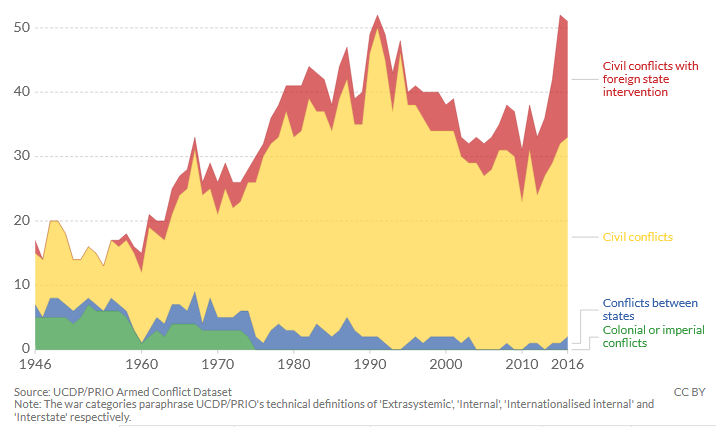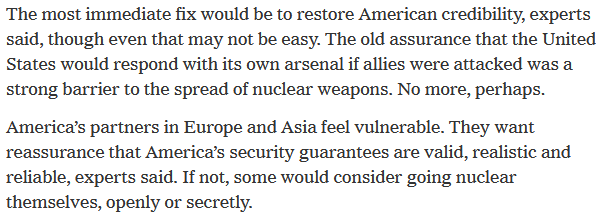
How much does 🇺🇸 spend on defense compared to the rest of 🌏?
That's a hard question to answer. For starters, we don't precisely know how much 🇺🇸 spends on defense (& that's the easy part).
[THREAD]
That's a hard question to answer. For starters, we don't precisely know how much 🇺🇸 spends on defense (& that's the easy part).
[THREAD]
This thread is inspired by a debate several folks were having recently about comparing US defense spending to that of other countries
https://twitter.com/mattyglesias/status/1370172613000069120
So how much does the US spend on defense?
One might think this is simply a budgeting and accounting exercise. That's part of it, but it's actually a conceptual exercise: what do we mean by "defense" or "national security"
jstor.org/stable/2145138…
One might think this is simply a budgeting and accounting exercise. That's part of it, but it's actually a conceptual exercise: what do we mean by "defense" or "national security"
jstor.org/stable/2145138…

I like thinking of the "defense budget" as "the money dedicated to fighting wars, preparing for yet more wars, and dealing with the consequences of wars already fought."
This is how it was described by @WilliamHartung & Mandy Smithberger in @thenation
thenation.com/article/archiv…
This is how it was described by @WilliamHartung & Mandy Smithberger in @thenation
thenation.com/article/archiv…
Given that conception of "national defense", the logical starting point for the US is the @DeptofDefense.
It's budget is reported in what is called the "Green Book"
comptroller.defense.gov/Portals/45/Doc…
It's budget is reported in what is called the "Green Book"
comptroller.defense.gov/Portals/45/Doc…

The DoD budget has two core parts:
- The Base Budget
- The Overseas Contingency Operations & Supplemental Budget
- The Base Budget
- The Overseas Contingency Operations & Supplemental Budget
The "Base Budget" includes pay to personnel and staff, procurement for weapons systems, R&D, facilities maintenance, and a portion for the US nuclear weapons programs (we'll come back to that). 

The Overseas Contingency Operations & Supplemental Budget is essentially the "War Operations" budget
This is what covers the costs of war operations IN Afghanistan, Iraq, Syria or anywhere that is classified as an overseas "Global War on Terror" operation
This is what covers the costs of war operations IN Afghanistan, Iraq, Syria or anywhere that is classified as an overseas "Global War on Terror" operation

Combined, these make up the bulk of what we call the "defense budget"
In Fiscal Year 2020, that amount came to ~$730 billion.
cnbc.com/2019/12/21/tru…
In Fiscal Year 2020, that amount came to ~$730 billion.
cnbc.com/2019/12/21/tru…
That's a lot of money -- but that's not everything.
A key part of the US "war capability" are our nuclear weapons. As stated above, those are only partially funded in the defense budget
A key part of the US "war capability" are our nuclear weapons. As stated above, those are only partially funded in the defense budget

The other funds for our nuclear stockpile goes to @ENERGY, namely the National Nuclear Security Administration
energy.gov/nnsa/national-…
energy.gov/nnsa/national-…
It's budget is peanuts compared to the overall DoD budget, but it still clocks in at between $15 billion and $20 billion in FY 2020.
So now the total "Defense Budget" is around $750 billion.
armscontrol.org/act/2020-03/ne…
So now the total "Defense Budget" is around $750 billion.
armscontrol.org/act/2020-03/ne…

But there is another big expense: pensions and disabilities.
That's not in the defense budget. That's in @DeptVetAffairs.
That's not in the defense budget. That's in @DeptVetAffairs.

The tally:
DoD + VA + NNSA of DOE = ~$970 billion in FY 2020
So we're nearly $1 trillion dollars....and we're still not done!
DoD + VA + NNSA of DOE = ~$970 billion in FY 2020
So we're nearly $1 trillion dollars....and we're still not done!
What about the various intelligence agencies, like the @CIA and @NSAGov?
Does @DHSgov count (which includes the @USCG)?
Or @NASA?
defense.gov/Explore/News/A…
Does @DHSgov count (which includes the @USCG)?
Or @NASA?
defense.gov/Explore/News/A…
In sum, coming up with a final number for 🇺🇸 defense spending is hard. It's both a conceptual (what is defense?) & budgetary (who gets how much money for what?) challenge.
That's just ONE reason it's difficult to know much the 🇺🇸 spends on defense compared to the rest of 🌏.
I'll go into more reasons in later threads
[END]
I'll go into more reasons in later threads
[END]
• • •
Missing some Tweet in this thread? You can try to
force a refresh






